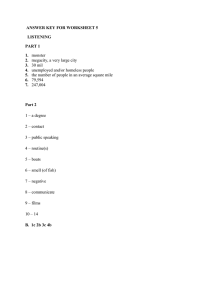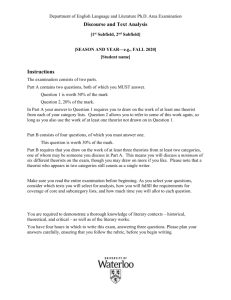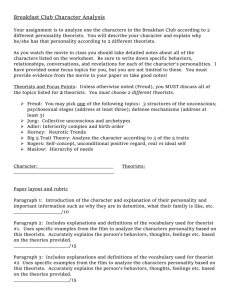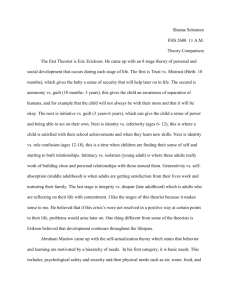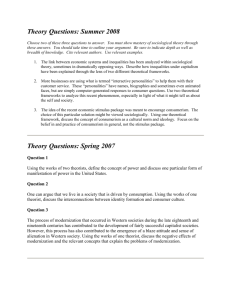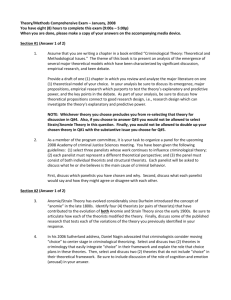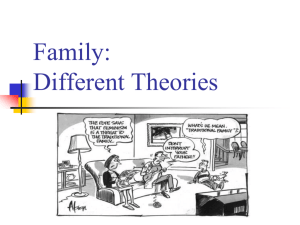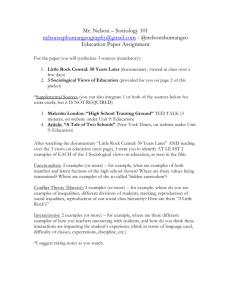Notes on Term Papers for SOC 607 What is a why-question?
advertisement
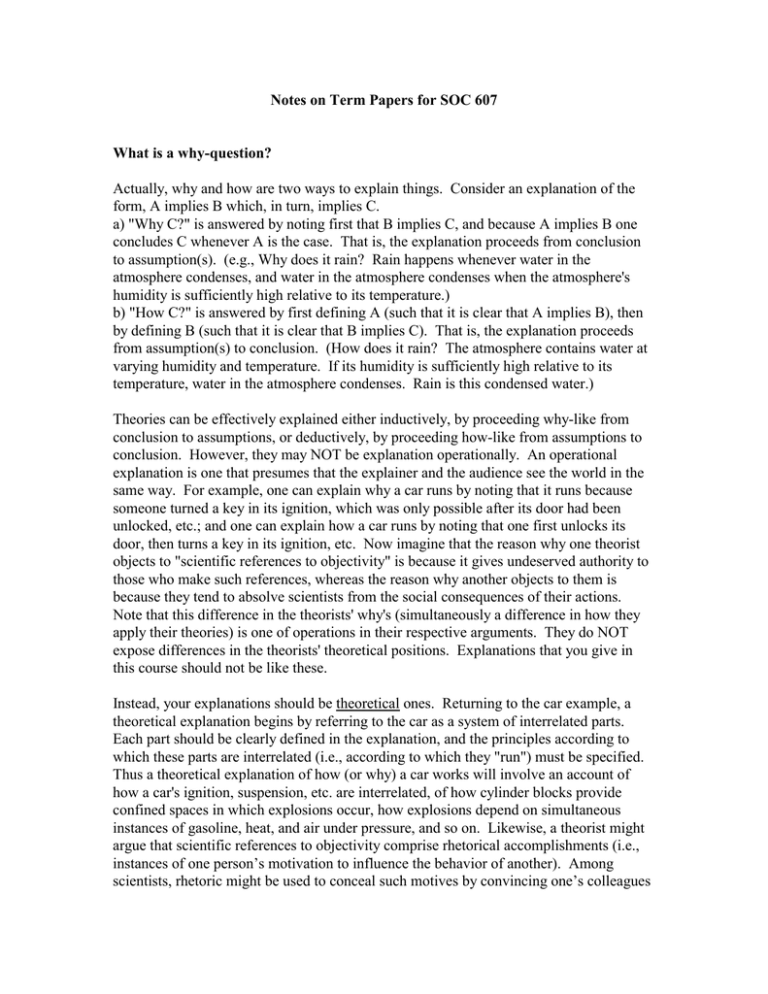
Notes on Term Papers for SOC 607 What is a why-question? Actually, why and how are two ways to explain things. Consider an explanation of the form, A implies B which, in turn, implies C. a) "Why C?" is answered by noting first that B implies C, and because A implies B one concludes C whenever A is the case. That is, the explanation proceeds from conclusion to assumption(s). (e.g., Why does it rain? Rain happens whenever water in the atmosphere condenses, and water in the atmosphere condenses when the atmosphere's humidity is sufficiently high relative to its temperature.) b) "How C?" is answered by first defining A (such that it is clear that A implies B), then by defining B (such that it is clear that B implies C). That is, the explanation proceeds from assumption(s) to conclusion. (How does it rain? The atmosphere contains water at varying humidity and temperature. If its humidity is sufficiently high relative to its temperature, water in the atmosphere condenses. Rain is this condensed water.) Theories can be effectively explained either inductively, by proceeding why-like from conclusion to assumptions, or deductively, by proceeding how-like from assumptions to conclusion. However, they may NOT be explanation operationally. An operational explanation is one that presumes that the explainer and the audience see the world in the same way. For example, one can explain why a car runs by noting that it runs because someone turned a key in its ignition, which was only possible after its door had been unlocked, etc.; and one can explain how a car runs by noting that one first unlocks its door, then turns a key in its ignition, etc. Now imagine that the reason why one theorist objects to "scientific references to objectivity" is because it gives undeserved authority to those who make such references, whereas the reason why another objects to them is because they tend to absolve scientists from the social consequences of their actions. Note that this difference in the theorists' why's (simultaneously a difference in how they apply their theories) is one of operations in their respective arguments. They do NOT expose differences in the theorists' theoretical positions. Explanations that you give in this course should not be like these. Instead, your explanations should be theoretical ones. Returning to the car example, a theoretical explanation begins by referring to the car as a system of interrelated parts. Each part should be clearly defined in the explanation, and the principles according to which these parts are interrelated (i.e., according to which they "run") must be specified. Thus a theoretical explanation of how (or why) a car works will involve an account of how a car's ignition, suspension, etc. are interrelated, of how cylinder blocks provide confined spaces in which explosions occur, how explosions depend on simultaneous instances of gasoline, heat, and air under pressure, and so on. Likewise, a theorist might argue that scientific references to objectivity comprise rhetorical accomplishments (i.e., instances of one person’s motivation to influence the behavior of another). Among scientists, rhetoric might be used to conceal such motives by convincing one’s colleagues that one’s perspective is a mere description of “the (unmotivated) facts.” Being beyond debate, the audience is expected to act in accordance with (i.e., presume the truth of) these facts. Armed with this theoretical explanation, one can derive such operational conclusions as “undeserved authority may be ascribed to those who use such rhetoric” AND “those who use such rhetoric may be absolved of responsibility for the actions of those whom it has motivated.” That is, the two operational “differences” are not really differences at all, given that they both are perfectly consistent with a single theoretical explanation. Do's and Don'ts when it comes to theoretical explanations 1a) Do NOT give operational explanations of theorists' ideas. Such writing merely shows that you can correctly apply theorists' vocabularies. Evaluation of such writing consists of whether or not my interpretation of the theorist jibes with yours. Disagreements reduce to differences of opinion on whether a theorist would have "really said such a thing." No learning results from such polemics (only, possibly, an indoctrination of the powerless student by a powerful teacher). 1b) DO give theoretical explanations of theorists' ideas. I would be happy (even overjoyed) to learn a way of interpreting a theorist that is different from my own. At issue here is that you convince me that your reading (as evidenced in your written rendering) of each theorist is defensible. What this means is that you must think of yourself as arguing (not merely expressing) each theorist's position. Doing this will require that you expose theorists' underlying premises, and draw contrasts among them. 2a) Do NOT merely synthesize the thoughts of a group of theorists. Most theorists begin from assumptions that contradict the assumptions made by other theorists. Your primary objective should be to expose contrasts, possibly among groups of theorists with parallel assumptions. 2b) DO compare theorists whose perspectives have contradictory assumptions, and make these assumptions (and thus their fundamental differences) explicit. Organize your term paper around contradictory premises (one section for each of three, minimally). 3a) Do NOT organize your term paper into sections devoted to concepts (e.g., science, equilibrium, etc.). The fact that social scientists define terms differently does not necessarily mean that their respective theories are based on fundamentally inconsistent assumptions. 3b) DO organize your paper into sections devoted to why- and how-questions. For example, "How does science influence social welfare?" or "Why do groups gravitate toward stable states of equilibrium?" Note: Be sure that you have distinct theoretical answers to these questions (i.e., answers grounded in logically inconsistent premises). 4a) Do NOT summarize articles in isolation. 4b) DO relate articles to the why- or how-question(s) that you are addressing. Only mention aspects of the articles that are relevant to these questions. 5a) Do NOT list isolated insights. 5b) DO present your arguments (and those of others) in full. Include all logical steps needed to follow your (and others') ideas. 6a) Do NOT assume that your reader already knows theorists' technical vocabularies. 6b) DO define each of your technical terms as well as those of each of the theorists you discuss. 7a) Do NOT give numerous, lengthy quotations from the articles. Moderation is called for here. 7b) DO feel free to paraphrase the arguments of other authors, however. You can explain their points clearer than they can in most cases, since you are putting their ideas into your context. 8a) Do NOT presume that the reader accepts that your interpretation of a theorist is accurate. 8b) DO give page references for each of the theorists' key arguments. This ensures that your reader understands why you have interpreted the theorist as you have. When giving page references indicate your source and page number as follows: (Wilson, Sawyer, and McDonald 1992:123). Direct quotations (in modest numbers) should be either between quotation marks or, if longer than a single sentence, double-indented and single spaced (without quotation marks). Some general tips 1) DO NOT WRITE ANYTHING THAT YOU DO NOT UNDERSTAND! See your instructor first. Then keep pressing me for answers until you do. 2) Make your term paper interesting. Choose a challenging topic and pursue it energetically. Avoid a superficial paper. Get to the heart of the problem and grapple with it. 3) Do not ask questions in your report! Argue for your position. 4) Do not use contractions (e.g., "I'll," "can't," etc.). 5) Never use the word "prove." (Science never "proves" anything.) And only speak of "causality" in a conditional sense. E.g., "Their argument suggests that X may cause Y." 6) Refer to yourself (e.g., we, our, us, etc.) as little as possible. And never mention your instructor. (It will not improve your grade.) 7) Speak of dead theorists in the past tense, and of living theorists (including yourself) in the present tense. E.g., "Marx argued that . . . " but "Patricia Hill Collins (1993) assumes that . . . " 8) In your writing do not refer to things as if they were people (i.e., do NOT anthropomorphize). Consider these two examples of misuse of the English language: • "The theory tells us that . . ." -- Theories tell you nothing, although you may infer from them. If you must use this form, then state that the theory "indicates" or "suggests." • "The question raised above asks . . ." -- Questions do not ask; people do. Please choose your words carefully! 9) Do not say what you or any theorist "wants" or "is trying" to do. Also do not write about what you or they expect or about what you think you reader might expect. 10) When you refer to authors, do not report your opinions on what they "think," "believe," "want," or "intend." You have no way of actually knowing their thoughts, beliefs, desires, and intentions. Also replace the words "say" and "state" with more informative words like "suggest," "claim," "assert," "deny," "indicate," etc. What's the point? A century ago scientists commonly believed that there is a unique overarching theoretical framework in terms of which all theorists' ideas can be understood. Since then it has become clear that there are many such frameworks (i.e., overarching is OK; unique ain't). There was a time when the vast majority of American sociologists happily interpreted all social phenomenon in functionalist terms. Nowadays rational choice theorists predominate. And whereas the reigning framework in China is Marxist, the one in Iran is Islamic. One key lesson that I hope students take away from SOC 607 is an appreciation that among many of these frameworks one finds basic premises that are logically inconsistent. Note that every social scientist who has learned this lesson is left with only two ways to work with sociological theories. On the one hand, one can embrace a logically consistent subset of these frameworks, and either ignore other frameworks or interpret them in accordance with this subset. On the other hand, one can acknowledge the inherent inconsistencies among the various frameworks that comprise contemporary sociological theory, and begin speculating about the social conditions under which these various frameworks apply. Make sure that your term paper does NOT exemplify the former approach. Your assignment is to write a term paper that takes the latter one. You will find that doing this will inevitably require that you demonstrate "the skill" (i.e., the ability to identify and clearly state the contradictory premises at the foundations of theories that are mutually inconsistent). If you know a theory's underlying assumptions, you know the social conditions under which it is appropriate. Whether or not it "applies" under those conditions is an empirical question, and is thus beyond the objectives of a theory course. That's why a course in theory is about "the skill," not about whether or not the theory is empirically true. How grades are calculated A = Term paper gives 2 or more well-developed arguments, each of which exposes contradictory underlying assumptions among 3 or more theorists. A- = Term paper gives 1 such well-developed argument. B+ = Term paper exhibits clear ability to apply the theoretical languages of at least 3 distinct contemporary theorists (but no contradictory assumptions are exposed). B = Term paper is restricted to a single theoretical mantra. Students' grades can be bumped down or up (by a - or +) for the following reasons: • Down: Not all explicit requirements of the assignment (e.g., not enough references, theorists discussed, etc.) were completed; notes and class presentations were consistently substandard; numerous unsubstantiated misinterpretations of theorists' positions are encountered in the term paper; plagiarism* (see “the trickster and the fool”). • Up: Two or more class presentations demonstrated exemplary skill at exposing theorists' underlying assumptions. * You have plagiarized if you use someone else’s words without giving them credit (by providing a citation, a page reference, and either placing their words between quotation marks or single-spacing & double-indenting their words). When you plagiarize someone else’s words, you violate my trust in your integrity to produce a term paper that is your own work. If I detect plagiarism, your grade will be reduced—how much depends on you. You will have a second chance to write a term paper—possibly a revision of the original one. However, this time I shall not assume your integrity; I shall be suspicious. If I find no evidence of plagiarism in this new paper, it will be docked by a half-grade (i.e., from A to A-, from A- to B+, and so on). If I again find evidence of plagiarism, you may fail the course.
